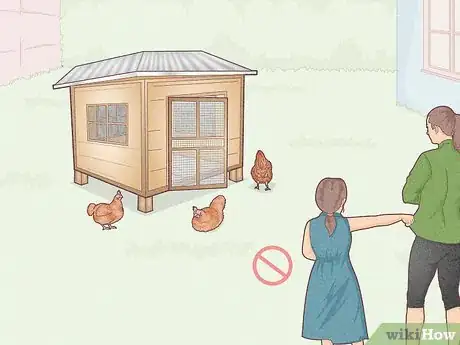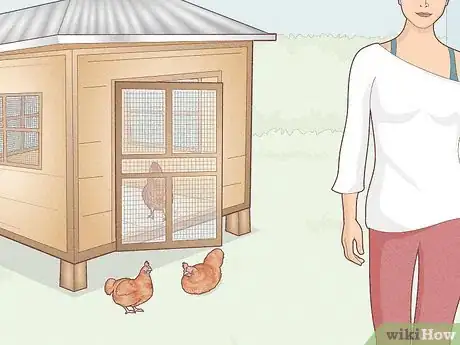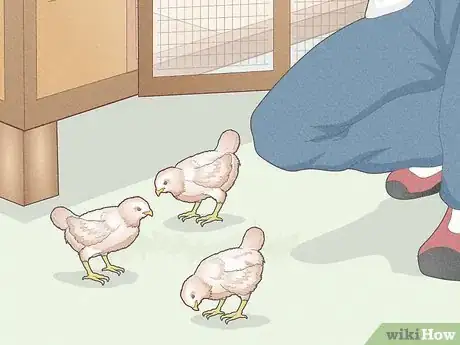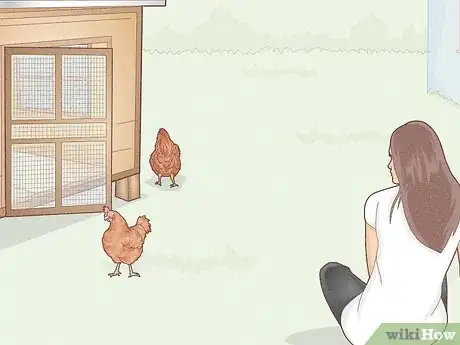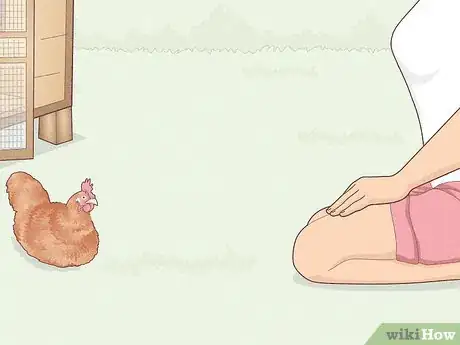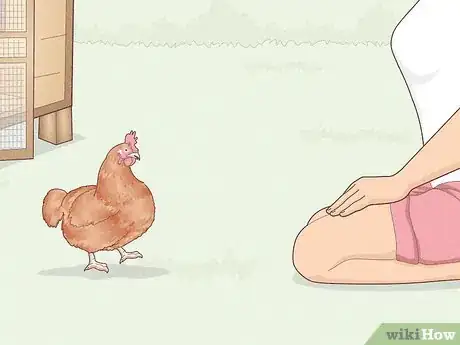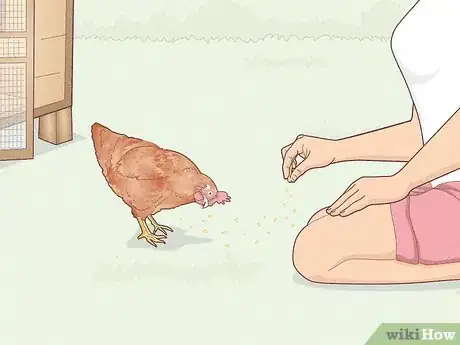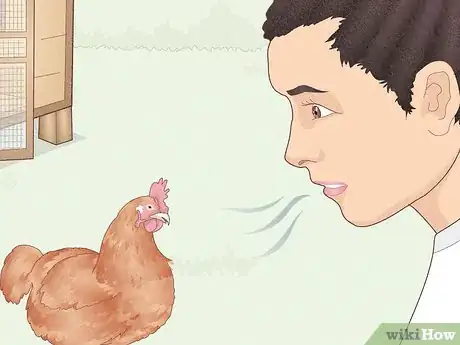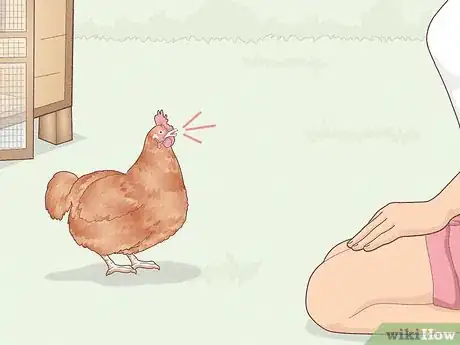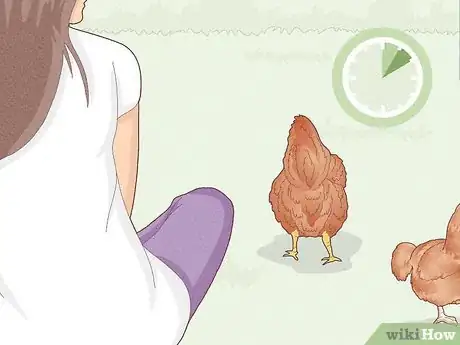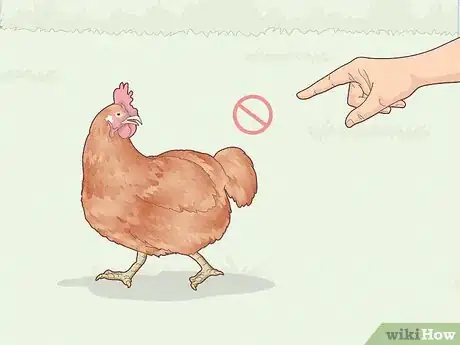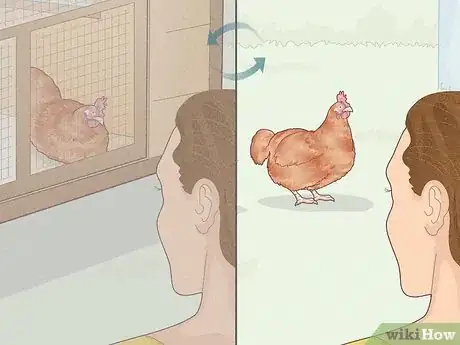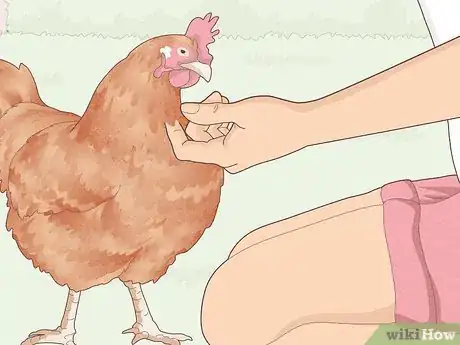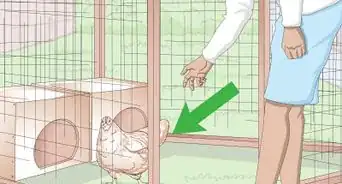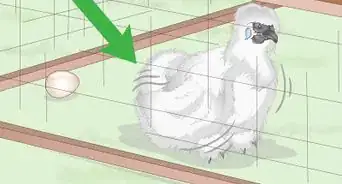This article was co-authored by Amy Harrison, a trusted member of wikiHow's volunteer community. Amy Harrison has over five years of experience working directly with poultry. She has worked on a rural chicken farm built around marketing free-range eggs, where she managed the care for the poultry year-round. She has experience breeding chickens and quail, caring for newborn poultry, handling their health issues, and managing their dietary needs.
This article has been viewed 24,755 times.
Learn more...
Chickens are great pets to keep in your very own backyard. They're friendly, docile, and can easily be handled; even by young children. But if you've got yourself a skittish chicken in the flock or you've bought some new hens that need some time to get use to you, you'll need to follow a method to get them to trust you. By following the steps below you'll soon have yourself a friendly, feathered friend.
Steps
Creating a Peaceful Environment
-
1Keep pets indoors, or away from your chickens. Chickens are known for co-existing with other pets in harmony, but if your flock isn't acquainted to interacting with other animals, they can easily become anxious and high-alert. Keep your dogs and cats indoors, and introduce them properly later on.
-
2Avoid bringing children with you. Young toddlers are often loud and may be overly-excited. Additionally, they may expect to hold the chicken when they aren't ready; especially if you do not know your chicken's temperament. This will easily discourage your chickens and even scare them off. Allow any children of the household to meet the chickens after you get to know the flock yourself. At this time you'll be able to know which chicken is docile enough to be held by young arms.Advertisement
-
3Eliminate noisy distractions. Keep your chickens contained to a quiet section of your garden or house. You could even confine them to a shed, providing they have plenty of room to move around and aren't cornered. Turn off any stereos, TV's, or radios, and get rid of any barking dogs or loud birds.
-
4Give new chickens time to settle in. An extensive move from different environments can put a lot of stress on your chickens, and even demote their egg production due to the adjustment in their living conditions. Continue caring for your chickens, but visit them less frequently to allow they time to adapt to their new home. Interacting with already fearful chickens will only put more pressure on them.
Interacting Techniques
-
1Start gaining your chickens trust at a young age. By being kind and treating your chicken's positively at an early age of their lives, it'll imprint onto them that you are generally safe and trustful. If you act as a motherly role by allowing your chicks to acknowledge that you feed and care for them, they may be more inclined to communicate and interact with you, and gain a special bond.
- There's no big task in taming chicks. As long as you care for them and handle them frequently they'll trust you and become tame. Chicks that you hatch yourself are easier to tame as you have to look after them regardless. Chicks that a hen has hatched for you are more difficult to tame as the mother hen will most likely become defensive when you try to handle her chicks and she'll likely prevent you from seeing them.
-
2Remain calm when you first meet your chickens. Chickens are not excited animals, and some breeds do not necessarily want to play or be touched. Approach your chickens in a calm, subtle state and speak to them in hushed tones. It's also best if you find a seat to sit in, or seat yourself down on the floor. Do not approach your chickens by stooping over them, as they will likely feel threatened. Keep at your chicken's eye-level.
- Avoid jumping straight into holding your chickens. Instead, let them come to you at their own pace. Chickens are curious animals that love to explore. They will presumably approach you and try to communicate.
-
3Keep your distance. Some chickens are easily intimated; often when their space is invaded. It's important to keep at least two foot of distance before you meet your chickens, and lower yourself to their eye-level. If you corner your chickens, or approach them too quickly, they may become anxious and present a fight or flight instinct.
- Remember, chickens are prey animals. If they aren't accustomed to human interaction they can easily become aggravated or scared.
-
4Allow the chickens to approach you. Chickens are curious in nature, and love to explore. If you sit still for a few moments, and quietly watch your chickens, they may bound up to you in curiosity, and even attempt to communicate to you. Even a glance towards you is a way of your chickens saying that they acknowledge your there. If your chickens are reluctant to walk over, entice them with some treats. Hold your hand out with small (limited) cubes of bread, cracked corn or chicken pellets. Like most animals, chickens are strongly driven by tasty food.
-
5Spread a handful of food beside you. Chickens spend most of their time foraging for food in the dirt. Obtain a few treats your chickens may like, such as cracked corn, or mealworms, and shake it next to where you are sitting. Your chickens will likely by encouraged to walk over and start scratching the dirt beside you, forming a trust bond.
- Ensure that the chickens know that you're placing food down. Shake a tin of cracked corn to get their attention, but be sure to not scare them off.
- Eventually, begin to place food on your lap or hold it out in the palm of your hand.
-
6Speak in hushed tones. Communicate to your chickens like you would with a small child or baby. Speak quietly and put on a soothing voice. Ask your chickens questions and make them know that you are trying to socialise with them. Avoid any sudden or loud gestures or remarks that may suddenly take them by surprise.
-
7Learn your chicken's communication cues. Similar to most group animals, chickens have a range of vocal signals and socialization cues. If you research and study each sound your chicken makes, you can learn what they want and what they are trying to communicate to you. Click here to learn how to talk to your chickens.
- When a chicken wants to be left alone, or feels threatened, they will raise their shackles (the feathers around their neck) and puff their feathers up to appear larger in mass. They will also make frequent clucking sounds. However, this is mostly persistent in roosters that are challenging you, or hens that are laying an egg or guarding their offspring.
-
8Set aside 1-2 hours each day to spend with your chickens. Chickens are straight-forward, but they still need a certain amount of care during the day. It's your job to feed them, give them water, collect their eggs, clean their coop, let them out each morning, let them in each night, and additionally communicate and interact with your chickens each day.
- Find a comfortable seat where you can sit at and be near the flock. You can read a book or listen to music with headphones whilst sitting down near your chickens. The chickens will get use to your presence and begin to trust you some more.
-
9Avoid punishing your chickens. Chickens aren't capable of mental time travel, so disciplining them for doing something wrong will be futile, as they won't understand what they have done wrong. Instead, offer positive, reward-based training to discourage your chickens from performing certain tasks. By negatively punishing your chickens (such as shouting or spraying them with water), you are losing their trust and any potential bond you have with them.
- If your chickens are inclined to get into your vegetable garden or ruin your flowers, repel them from the area by investing in some chicken wire or confining them to a certain location of your property.
-
10Create a routine. Set aside a time each morning and evening to repeat the steps above on a daily basis. Chickens like to have a constructed regime in place instead of jumping back and forth between visits. This way, they'll know when to expect you and will establish a calmer front.
-
11Begin to handle your chickens. If your flock seems friendlier and more docile towards you, attempt to pet, stroke or hold your chickens. Chickens like to be lightly scratched under their chins, and some may like to be stroked on their back in the direction their feathers lay.
- Chickens also like to perch on your arm or finger. It makes them feel secure, and when you pick them up, putting a finger underneath or lightly touching their feet can make the difference between them feeling trapped in your embrace or secure and safe.
- When handling your chickens, keep in mind that all chickens are different, and some may not like being handled at all. If the chicken backs off when you try to pet them, or gets irritated when you stroke them, stop promptly and try again another day.
- To hold your chickens, firmly put your hands over their wings and hold their body close to your chest. Make sure that their heads are away from your eye-level, as an aggravated chicken can easily strike a peck.
Community Q&A
-
QuestionWill I be able to make friends with an adult chicken even if it is scared of me?
 Cliodhna ReidyCommunity AnswerYes! I have chickens, and if you keep giving them treats, they will warm up to you.
Cliodhna ReidyCommunity AnswerYes! I have chickens, and if you keep giving them treats, they will warm up to you. -
QuestionHow long might it take to tame my baby chicks?
 Rachel MccarthyCommunity AnswerIt may take 1 year or couple of months, depending on how well you raised them and how often you interact with them. Be careful and caring around them.
Rachel MccarthyCommunity AnswerIt may take 1 year or couple of months, depending on how well you raised them and how often you interact with them. Be careful and caring around them. -
QuestionHow do I keep my chicken safe from other pets like dogs or cats?
 Rachel MccarthyCommunity AnswerKeep them in a coop or in a fenced-off area. Or, keep your other animals inside while the chickens are out.
Rachel MccarthyCommunity AnswerKeep them in a coop or in a fenced-off area. Or, keep your other animals inside while the chickens are out.
Warnings
- Avoid too many treats. Treats are delicious and can easily entice your chickens, but too many is harmful to their digestion system and health. Cracked corn has little protein value, and bread can cause a sour crop.⧼thumbs_response⧽

